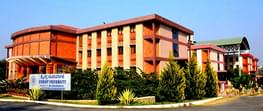The University of Trans-Disciplinary Health Sciences and Technology, Karnataka, also known as TDU Bangalore is a private, co-ed University, that is the resultant of the vision to combine the knowledge of ancient Ayurveda with modern Science and Technology.· TDU offers undergraduate, postgraduate, doctoral degrees alongside diplomas and certificates in the University Semester system.
Table of Content
TDU Bangalore Highlights
| Established | Institute Type | 2013 | Private |
| Approved by | UGC |
| Entrance Exam | TDU’s Admission Assessment process |
| Courses Offered | UG, PG, Doctoral, Diploma, and Certificate |
| Popular Courses | M. Sc. By Research, Ph. D |
| Application Mode | Offline |
| Admission Criteria | Merit-based |
| Campus Area | 16.5 acres of land and 1,77,000sq.ft area of a campus building and research hospital |
| Facilities Available | Library, Hostel, Research Laboratories, Indoor, and Outdoor Sports Facilities |
| Official Website | http://tdu.edu.in/ |
Ranking/ Awards/ Achievements
- The parent establishment of TDU, FRLHT received the prestigious Norman Borlaug Award for the Conservation of Medicinal Plants.
- United Nations selected FRLHT for the Equator Initiative Prize, for linking conservation to livelihood needs.
- Between 2002 & 2010, FRLHT and TDU were recognized as National Centre of Excellence by the Ministry of Environment and Forest, Department of Science and Technology (DST) and Ministry of AYUSH.
- FRLHT won its first International award for Cultural Leadership in Traditional Medicine.
TDU Bangalore Courses
The table below lists the programs that TDU has received approval for delivering. However, as of now, the university is offering only select programs.
| Programs | Eligibility Criteria | Application Fee | Program Fee (Annual) |
|---|---|---|---|
| Ph. D | Post-Graduate degree | INR 1,000 | Fee INR 25,000 |
| M.Sc (Life Science) | Bachelor degree in relevant field | INR 500 | INR 1,25,000 |
| M. Sc. By Research | Bachelor Degree in relevant field | INR 500 | INR 50,000 |
| B. Sc. Life Science (Conservation Science) | Qualified Class 12th or Pre – University | -- | INR 1,25,000 |
Note: TUD Bangalore also offers
Certificate Courses in the following subjects.
- Primary Health Care
- Ethnobotany
- Yoga Teacher Program
- Stress Management
- Indian System of Medicine and Healing
Diploma Courses in
- Ayurvedic Diet and Nutrition (DADN)
- Panchakarma Therapy
Read More: TDU Bangalore Courses and Fees
TDU Bangalore Admissions
The University of Trans-Disciplinary Health Sciences and Technology shortlists applicants on the basis of academic credentials and CV. Please note, admission at TDU is strictly on the basis of merit. The TDU Admission Process is elaborated below:
Application Procedure
Step 1: Download Application Form from the TDU website, fill-in and submit with the requisite application fee and supporting documents. Submission is either by post or in person at the TDU Academics Office
Step 2: Shortlisted applicants are called for Written exam / Personal Interviews.
Step 3: Based on the applicant’s performance in the Written Exam/ Interview Admission decision is made.
Step 4: Selected candidates are notified via email; candidates must email their acceptance of the admission offer within the specified deadline.
Note: TDU gives 75% weightage on Applicant’s Academic records and 25% weightage on Entrance assessment/ Personal Interview.
TDU Bangalore Scholarships
TDU has the provision to provide financial help to meritorious students from the economically weaker sections. Help is given in the form of scholarship/ fees concession, the amount and the percentage of which is decided by the authorities from time to time.
Financial assistance is decided at the time of admission and can be either a
- Need-based scholarship
- awarded on the basis of the total family income of the applicant, or it can be a
- Merit scholarship awarded on the basis of the academic records of the applicant.
- TDU also assists students in securing educational loans.
TDU Bangalore Facilities
The University of Trans-Disciplinary Health Sciences and Technology, Karnataka boasts of ‘Knowledge Park’ - an ethnomedicinal garden composed of more than 1500 species of medicinal plants from various bio-geographical regions of India and over 46 theme-based demonstration plots. TDU currently has 4 acres and 25 guntas owned by FRLHT trust and 12.5 acres’ land leased by Forest Department, Govt. of Karnataka.
-
Infrastructure: The campus building and research hospital span across 1,77,000 sq. ft. built-up area and includes 22 IT-aided classrooms, lab, Library, administrative offices, cafeteria, indoor sports area, accommodation for faculty and student, and Research hospital.
-
Hostel: The Hostel at TDU has separate well-maintained blocks for boys and girls. Rooms are furnished and are available in both single and double occupancy types.
-
Library: The TDU Library has a collection of 8600 books in diverse subjects.
-
Hospital: The 100-bed Integrative healthcare hospital TDU inherited from its parent organization – FRLHT, where contemporary relevance of the Ayurveda knowledge system is demonstrated to students and scholars.
-
Other facilities: Residents can also avail of dining facilities as well as indoor and outdoor games facilities within the premises.
-
Library: The TDU Library has a collection of 8600 books in diverse subjects.
TDU houses the country’s only Herbarium and Raw Drug repository of Medicinal plants used in the Indian System of Medicine.
TDU Bangalore Faculty
TDU has 43 full-time faculties on its rooster, apart from several Part-time faculties spread across its seven academic centers. An indicative list is presented below:
-
Total number if faculty is 43 with 26 of them having a Ph. D as their highest qualification. TDU also boasts of 8 visiting faculty
-
The Teacher-student ratio at TDU is 1:5. For Research scholars, the teacher-student ratio is 3:1. Please note that the given ratio is dynamic in nature and depends on the course and enrollment.
-
There are 99 research scholars enrolled at TDU as in August 2019; 50 research papers have been presented since 2014, six books published, one design patent for water purifier filed and trademark applied for.
Few of them are:
Name & Qualification: Prof. Gurmeet Singh, Ph. D
- Designation: Professor, Head Centre
- Experience: 24 years
- Published Papers: 19
Name & Qualification: Prof. Shobha Udipi, Ph. D – Food and Nutrition
- Designation: Professor Emeritus
- Experience: 31 years
- Published Papers: 91
TDU Bangalore FAQs
Ques. Does TDU have any off-shore campus or off-campus center from where I can pursue programs?
Ans. No, TDU has not established any off-shore campus or off-campus center anywhere.
Ques. Does TDU offer a distance education program?
Ans. No, TDU does not offer a distance-education program
Ques. Can I submit my TDU application for admission online?
Ans. The TDU application for admission has to be submitted offline, either by post or in person at the TDU Academics Office.
Ques. Does TDU have approvals of relevant statutory bodies such as AICTE, BCI, DEC, DCI, INC, MCI, NCTE, PCI, etc.?
Ans. The current set of programs offered by TDU does not require approvals from any of the statutory bodies. These courses are approved by the University’s Academic Research and Outreach Council.
Ques. Does TDU offers any bridge course?
Ans. Yes, TDU has the provision of a bridge course for the academically weak students to bring them up to the expected standards of the university at the beginning of each program.
Ques. Is the Ph. D program offered by TDU a full-time or part-time program?
Ans. TDU offers Ph. D program according to the latest UGC regulations, in both full-time and part-time modes.
Ques. What teaching methodologies are employed at TDU?
Ans. Apart from classroom teaching, TDU employs Weekly Practicum, Seminar and presentations, Field visits, Projects, assignments, Guest lectures, Tutorials, and Workshops to deliver the programs effectively.
Ques. How are the students evaluated at TDU?
Ans. TDU evaluates students through a judicious mix of Continuous evaluation (Assignments, seminars, field reports, group discussion, classroom participation, reflective reports, practical’s, etc.) and term-end examination, with a weightage of 75% and 25% respectively on the components involved.
Ques. How does TDS evaluate term-end examination answer scripts?
Ans. TDU follows a centralized system paper evaluation system for both for UG and for PG courses wherein in-house and external faculty members from other academic institutions constitute the Board of Examiners.
Ques. Does TDU follow any reservation policy for admission purposes?
Ans. As TDU was established by a State Legislative Act, 40% of the seats are reserved for the applicants from Karnataka. All students are required to go through the regular admission process and seats are allotted as per the merit and reservation policy of the State Government. Please note that there is no management quota available for admission in TDU.







![Narsee Monjee Institute of Management Studies - [NMIMS University]](https://image-static.collegedunia.com/public/college_data/images/appImage/28986_bg.jpg?h=111.44&w=263&mode=stretch)



![Mount Carmel College - [MCC]](https://image-static.collegedunia.com/public/college_data/images/appImage/1697620095IMG3378.png?h=111.44&w=263&mode=stretch)



![Kristu Jayanti College - [KJC]](https://image-static.collegedunia.com/public/college_data/images/appImage/1504500612cover.jpg?h=111.44&w=263&mode=stretch)

![The Oxford College of Science - [TOCS]](https://image-static.collegedunia.com/public/college_data/images/appImage/6988_OXFORDCOS_APP.jpg?h=111.44&w=263&mode=stretch)

![Jyoti Nivas College - [JNC]](https://image-static.collegedunia.com/public/college_data/images/appImage/2209_JNC.jpg?h=111.44&w=263&mode=stretch)






![Gujarat University - [GU]](https://image-static.collegedunia.com/public/college_data/images/logos/1481521529lofo gu.png?h=72&w=72&mode=stretch)
![Rungta College of Science and Technology - [RCST]](https://image-static.collegedunia.com/public/college_data/images/logos/1687841728SRGILogo.jpg?h=72&w=72&mode=stretch)

![SIES Indian Institute of Environment Management - [SIES IIEM]](https://image-static.collegedunia.com/public/college_data/images/logos/1416052293logo.jpg?h=72&w=72&mode=stretch)
![National Institute of Pharmaceutical Education And Research - [NIPER-A]](https://image-static.collegedunia.com/public/college_data/images/logos/1486964069NiperKolkata.png?h=72&w=72&mode=stretch)
![Synetic Business School - [SBS]](https://image-static.collegedunia.com/public/college_data/images/logos/1683634125SBSLOGONew20222.jpeg?h=72&w=72&mode=stretch)




![Mafatlal Gagalbhai Science Institute [MGSI]](https://image-static.collegedunia.com/public/college_data/images/logos/1714198478Untitled.png?h=72&w=72&mode=stretch)





Comments